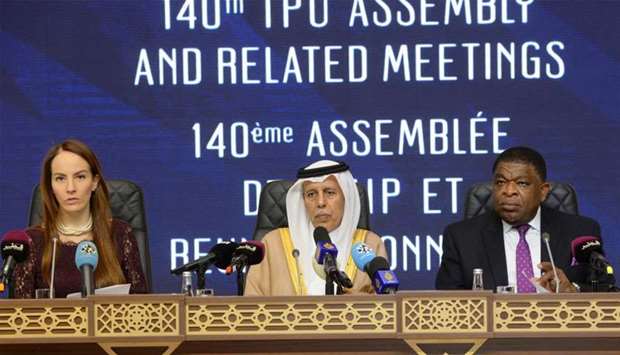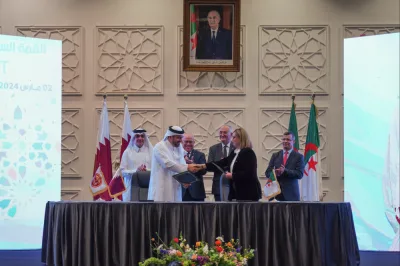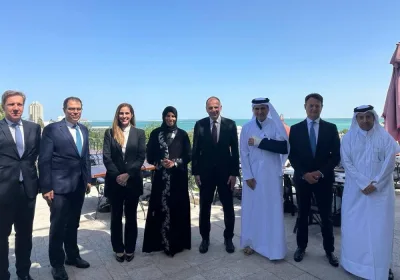*Separation of families hurts, not the blockade: Al-Mahmoud
*80 parliament speakers, 40 deputy speakers and 2,200 members of parliaments attend historic Doha event
Qatar has put the blockade imposed on it by Saudi Arabia, the UAE, Bahrain and Egypt behind it but the resulting separation of families across the GCC region is still a matter of concern, HE the Advisory Council Speaker Ahmed bin Abdullah bin Zaid al-Mahmoud said on Wednesday.
HE al-Mahmoud made the observation while addressing a press conference on the concluding day of the 140th Assembly of the Inter-Parliamentary Union (IPU) in Doha, alongside IPU president Gabriela Cuevas Barron and IPU secretary-general Martin Chungong.
"We in Qatar have said the blockade is behind us, but what continues to be painful for us is the ongoing severing of close family relations within the GCC countries. This has resulted in a lot of suffering for many families across the Gulf region, as some of the blockading countries have not stopped from separating a mother, who is one of their citizens, from her children, only because the father is a Qatari citizen and naturally his children are Qataris.
"This has also had negative consequences such as interruption of education, with some of these countries denying Qatari students access to complete their studies."
He noted that these acts amounted to violations of basic human rights and such family issues should not be hostage to politics. HE al-Mahmoud said all such violations have been documented in a report of the United Nations High Commissioner for Human Rights, which affirmed that what is happening against Qatar in this regard is unethical, inhumane and illegal and could amount to the waging of an economic war.
The Advisory Council Speaker, who was also president of the 140th IPU Assembly, said Qatar appreciated the praise it received for its hosting of the assembly and its accompanying meetings despite the unjust blockade, the official QNA reported.
He stressed that the praise reflected the appreciation of the IPU members of His Highness the Amir Sheikh Tamim bin Hamad al-Thani, Qatar's government and the people.
"During the event, we held many meetings with the speakers of parliaments of different countries and heads of delegations, who expressed their appreciation for the high level of organisation of the assembly. They also met with His Highness the Amir Sheikh Tamim bin Hamad al-Thani and HE the Prime Minister and Minister of Interior Sheikh Abdullah bin Nasser bin Khalifa al-Thani. They expressed their admiration for Qatar's ability to organise an event of this scale in spite of the ongoing blockade," HE al-Mahmoud observed.
"All of them affirmed their rejection and condemnation of the unjust blockade, describing it as illegal and noting that it should not go on. They expressed their support for us since the very start of the crisis," he added.
HE the Speaker also referred to the IPU president's position on the blockade, noting that the same view was shared by other parliament speakers during their meetings with Qatari delegates, QNA said. They all stressed their rejection of the blockade and called for an end to it, he said, adding that the wide participation in this year's assembly was the biggest response to the blockade.
The 140th IPU was described by Cuevas Barron as exceptional in the history of IPU assemblies with the participation of 80 parliament speakers, 40 deputy speakers and 2,200 members of parliaments representing another 46,000 around the world. All came to Qatar looking to seek a better future for the world in terms of peace, stability and the rule of law, it was observed.
She said it has been a wonderful event with platforms to enhance communication and promote dialogue for a better quality of life for the people, stressing that the countries that failed to take part in the event missed a great opportunity for promoting peace and stability in the world. She also talked about the various achievements of the 140th IPU Assembly and its positive outcomes.
Similarly, Chungong described the Doha meetings and assembly as successful and fruitful. He said the IPU rejects any practice that violates the human rights of parliamentarians anywhere in the world or any limitation on them to exercise their rights. "So, the IPU does not ignore the issues of Palestinian parliamentarians and extends its support to resolve them."
In response to a question on parliamentary diplomacy, HE the Speaker said it was an important part of political work, noting that the union's meetings with the UN focused on political conditions all over the world, and warned that there was a slow reaction in dealing with some of the problems. He also highlighted that the UN, during a meeting with the IPU three months ago in New York, asked parliaments for help in achieving its goals. The union for its part proposed a wider use of preventative diplomacy to help resolve problems rather than wait for it to occur.
The IPU assembly stressed the right of children to quality education, which in turn would promote stability and security and constitute a strong foundation to counteract terrorism and violent extremism.



